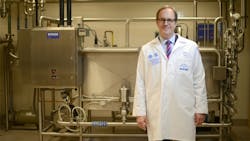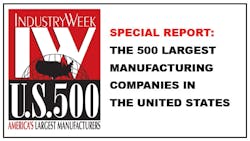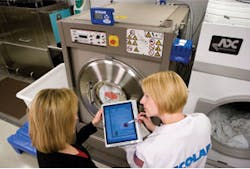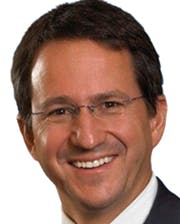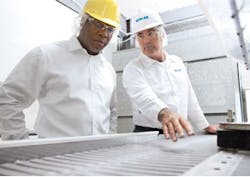The IW US 500: Just Add Water: Ecolab Rises Via Acquisition
One of the top gainers in this year's IW 500 list is Ecolab (IW 500/99). The St. Paul, Minn.-based maker of cleaning and sanitation products vaulted 52 spaces, from No. 151 in last year's ranking to No. 99 this year.
Virtually all of Ecolab's 74% revenue gain—from $6.8 billion in 2011 to $11.8 billion in 2012—stems from its late-2011 acquisition of Nalco, a Chicago-based manufacturer of industrial water treatment chemicals. The $5.4 billion acquisition was an ambitious move by Ecolab, which provides hygiene, water treatment and energy technologies to the food, hospitality and health care markets.
See Also: The IndustryWeek U.S. 500 Rankings
Ecolab's leaders felt the Nalco merger was necessary because the company's food-industry customers use large amounts of water in their operations, and many of them have been expanding into developing countries where clean water is much scarcer than in industrialized nations.
Ecolab CEO Doug Baker says he and his leadership team started recognizing the need to augment the company's water capabilities about a decade ago.
"The root of this was back in '02," Baker says. "We identified the need to have a leading water technology capability because of the markets we served—especially food production, food service and food distribution. This is a group of industries that consume a lot of water, and they were increasingly having trouble finding water, particularly in emerging markets."
Ecolab's initial water development strategy consisted of making small acquisitions and growing organically. That worked for a few years, to a limited extent.
"We gradually built a capability in that area," Baker says, "but it was south of $200 million globally."
Then, about six years ago, according to Ecolab Executive Vice President Christophe Beck, the company started to notice its customers' water-capability needs accelerating, so Ecolab's leaders decided to look for an opportunity to make a bigger move to get out in front of that trend.
"I was involved in strategic planning, and we started to recognize that water was soon going to become the world's No. 1 most pressing need," Beck says. "You could debate how long this would take—maybe 10 years, or 15, or 20—but we knew we were going to live to see it happen. So we started looking at how we could address this situation in the most effective way. We felt we had two options. One was to do it ourselves, building on what we already had. The other was to acquire a company that could complement what we were doing."
An obvious merger candidate was Nalco.
"It's the largest company in water treatment worldwide," Beck says. "They're naturally complementary to us in several ways. And our companies had been admiring each other for years."
The Courtship Begins
Baker says he first met with Nalco's leaders at an industry event in January 2011. They started talking about projects their companies might collaborate on, and it didn't take long for the talks to start moving in the direction of merger.
"The way the conversation started, we were just investigating different areas where we might cooperate and work together," the CEO says. "But it quickly moved to a point where it started to look like a combination of the companies was the answer that made the most sense. For us it made sense because we wanted to address this critical need for our customers long-term, which would enable to us to grow, both in our core legacy technology and in opening up new markets."
Ecolab's core technology consists of an array of businesses the company has built over its 90-year existence: cleaning, sanitation, pest control, maintenance products and services. The company's Cleaning and Sanitizing unit serves hotels, schools, and commercial and institutional laundries. Its Kay Chemical subsidiary provides cleaning supplies to restaurants and groceries. Other units provide products for textile care, water care, health care, and food and beverage processing.
The opening of new markets was a key factor in the decision to merge—and not only for Ecolab. There were similar benefits for Nalco, Beck notes.
"We saw that putting our companies together would open both of us to new segments," he says. "For Ecolab, it would enable us to enter some heavy manufacturing markets. We could go into energy, oil and gas, power generation—all areas we were not covering. And Nalco would also be able to enter areas they were not covering, which was mainly everything antimicrobial, like food safety and infection prevention."
There were other commonalities between Nalco and Ecolab that helped support the case for merging, according to Baker.
"Nalco ran a business model nearly identical to ours," the CEO says. "And we were familiar with their technology."
Ecolab has made many acquisitions over the years, but none as big as the Nalco deal. Mutual familiarity can be crucial in a merger of this size and complexity, especially when it comes to integrating two companies that are deeply established in their markets. Baker says he has learned that large acquisitions are more likely to succeed if they are "rooted in some areas that you understand."
"They need to be rooted in either a technology you understand, or a market you understand, or a business model you understand," Baker explains. "Ideally you want to have at least two out of those three things—areas where you feel you have competency. With the Nalco deal, we understood the model quite well; we understood the technology quite well; and we understood many of the markets quite well—not all of them, but many of them. So that was a big plus for us."
Ambitious Timetable
Once the decision to merge Ecolab and Nalco was finalized, the integration of the companies began, full speed ahead. Ecolab's goal was to have the integration substantially completed within a year, so the company's leadership team directed a large amount of resources to get the job done quickly. This included the dedication of a large full-time integration team, and thousands of man-hours of preparatory work.
"We did a ton of advance work," Baker says. "We decided that if we were going to make a mistake, it was going to be because we had too many resources focused on integration. If anything, we were going to take it too seriously; we were going to overestimate it, not underestimate it."
Baker tapped Christophe Beck to head up the merger integration team. "I decided to take one of our senior leaders, Christophe, out of one of our largest businesses and asked him to lead the integration," the CEO says. "I think it was a surprise, because when I asked him to do it, he didn't even know we were contemplating the deal."
The integration team was made up of about 60 people and augmented by external consultants, according to Baker.
"Obviously that's not a small investment," he points out. "We populated the team with both legacy-Nalco and legacy-Ecolab people, and we hired Deloitte and some other outside help. We fundamentally wanted the priorities to be on what we considered our long-term value drivers: our team and our customers. If you do those things right, you're going to end up with favorable financials."
Baker says he instructed Ecolab's integration team to be conservative in its expectations and assumptions.
"Our default position was basically 'bad news,'" Baker says. "For every aspect of this integration that we didn't feel totally confident about—that we weren't totally sure we could nail down—our bias was 'Let's assume it's not going to be positive.' We've learned from doing a number of these deals that that's a safer place to play because it prevents you from underestimating challenges—and under-resourcing them."
Realism Wins
As a result of this skeptical approach, the rough spots in the integration have been few and manageable, Baker says.
"Most of the surprises have been positive ones," he says. "And the negative ones have been completely in the realm of, you know, things like inventory—all the normal stuff of running a business."
An interesting upshot of the integration, according to Beck, has been Ecolab's discovery that Nalco has an extremely well-developed, highly prioritized safety program woven into its culture. Ecolab is taking advantage of this and incorporating Nalco's safety approach into its own culture.
"While safety has always been important at Ecolab, it was not as high on the priority scale as it was at Nalco," Beck says. "At Nalco it's absolutely No. 1, above everything else, almost like a religion. When we realized that, we said, 'We want to go down that path.' So Nalco is helping us do that."
Earlier this year Ecolab completed another sizable merger, acquiring Houston-based specialty chemical maker Champion Technologies for $2.2 billion. Champion serves the oil and gas industry, manufacturing additives and providing services to help companies tap deposits that are difficult to access and that require extra processing. The Champion acquisition boosts Ecolab's projected annual revenue to $13 billion.
Thus, as a result of the Nalco and Champion acquisitions, Ecolab has almost doubled its revenue footprint in less than two years. But CEO Baker says he doesn't foresee any more big acquisitions in the offing.
| See how Ecolab has created a lean culture at its Garland, Texas plant at iw.com/ecolab-lean. |
"This last couple years has been a repositioning period for our company, done from a position of strength," Baker says. "Right now we're positioned in a great spot, right where we want to be. So, going forward, we plan to take the same approach we have for most of the 90 years we've been in business: organic growth as the principal value driver, supplemented by smaller bolt-on acquisitions that bring either new geographic coverage or new technology to the party."
About the Author
Pete Fehrenbach
Pete Fehrenbach, Associate Editor
Focus: Workforce | Chemical & Energy Industries | IW Manufacturing Hall of Fame
Follow Pete on Twitter: @PFehrenbachIW
Associate editor Pete Fehrenbach covers strategies and best practices in manufacturing workforce, delivering information about compensation strategies, education and training, employee engagement and retention, and teamwork. He writes a blog about workforce issue called Team Play.
Pete also provides news and analysis about successful companies in the chemical and energy industries, including oil and gas, renewable and alternative.
In addition, Pete coordinates the IndustryWeek Manufacturing Hall of Fame, IW’s annual tribute to the most influential executives and thought leaders in U.S. manufacturing history.
